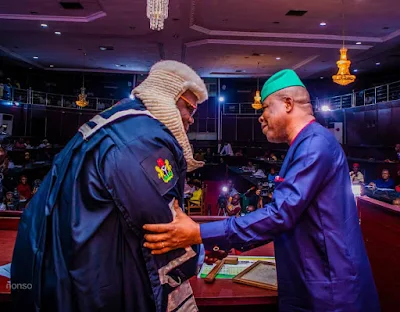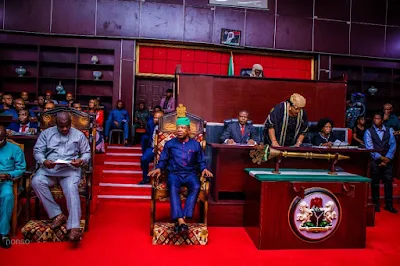 |
| Imo State Governor Budget Presentation |
Mr. Speaker, Honorable members, having reviewed the activities of our Government thus far, may I at this point present to you the year 2020 budget dubbed “Rebuild Imo – Budget One”. Clearly, the 2020 budget will be our first full year of the commencement of the “Rebuild Imo” project.
 |
| Imo State Governor with the State Assembly Speaker during the presentation |
 |
| Imo State Governor Emeka Ihedioha sitting during the budget presentation |
MAJOR POLICY THRUST OF THE 2020 BUDGET
The 2020 budget proposal, which encapsulates government’s political, economic and social development and strategies, therefore aims at giving the citizenry a sense of belonging. The proposal is aimed at restoring confidence in Government and our people, rebuilding our dilapidated infrastructure and putting the State on a pedestal for sustainable economic development. This will focus on road infrastructure, improving on the ‘ease of doing business’ and social infrastructure – education, health services, water, sanitation and the like.
The 2020 Budget is anchored on our manifesto, the TTC report as well as recommendations of the various Commissions of Enquiries that have turned in their findings.
At this point, I reiterate that our Administration owes as a duty the prudent and judicious use of State resources, respect for rule of law, as well as ensuring accountability and transparency in all projects, programmes and activities.
FOCUS OF THE 2020 PROPOSED BUDGET
The 2020 budget is six-pronged, thusly:
- Rebuilding Infrastructure – especially roads and smart electricity sub-sector.
- Agriculture – by laying the groundwork for sustainable agriculture.
- Health delivery – with focus on health insurance, primary healthcare and cleaner environment.
- Human Capital Development – especially technological advancement, technical education, Women and Youth empowerment etc.
- Ease of Doing Business (EoDB).
- Job/Wealth Creation and Youth Empowerment.
These six-planks of the budget will be achieved through:
• Enhancement of Internally Generated Revenue (IGR)
• Aggressive road reconstruction programmes
• Enabling environment for private sector investment
• Smart Public Private Sector Partnerships
• Capacity building especially for the youth, provision of Agricultural inputs and development of agricultural infrastructure.
• Mutually beneficial State – Local Governments partnerships
• Health insurance, primary healthcare and cleaner environment.
Basic Assumption of the 2020 budget
A. MACRO-ECONOMIC ENVIRONMENT
Mr. Speaker, Honourable Members of the State Assembly, the 2020 Budget is predicated on the following assumptions:- FGN’s Medium Term Expenditure Framework (MTEF) and Fiscal Strategy Paper (FSP).
- FGN’s adoption of an oil price benchmark of US$57 per barrel, daily oil production estimate of 2.18 mbpd and an exchange rate of N305 per US Dollar for 2020.
- National Growth of 2.93% in 2020, driven largely by non-oil output, as economic diversification accelerates, and the enabling business environment improves. However, inflation is expected to remain slightly above single digits in 2020.
- FGN’s increase of the VAT rate from 5% to 7.5%. As such, the 2020 Appropriation Bill is based on this new VAT rate. The VAT Act already exempts pharmaceuticals, educational items, and basic commodities, which exemptions we are expanding under the Finance Bill, 2019.
B. REVENUE
I. Given the very fact the IGR is the sine quo non to budget success, the 2020 Budget has a total budgeted recurrent revenue of N140,330,473,912, representing 71% of the budget.C. RECURRENT EXPENDITUREPERSONNEL COST
Very much unlike the 2019 budget that has N15,304,901,626 as personnel cost for Ministries , the proposed 2020 budget has N 8,949,496,411 as its personnel cost which represents a 41.5% reduction in Personnel Cost.OVERHEAD COST
The overhead cost in the proposed 2020 budget will relatively increase to N 34,702,219,005 from the N17,112,658,110 that was approved in the 2019 budget. This is also as a result of increase in government activities, restoration of full workers’ salaries, allowances and the observance of the principle of separation of power between the three arms of government. We also restored the autonomy of the Local Government Administration. However, stringent measures will be taken to cut expenditures by Ministries, Department and Agencies (MDAs).In summary, the Recurrent expenditure is N 91,377,822,129 . However, this figure includes the repayment to FGN on debts including bailouts funds and rescheduled service of bonds.
Our capital expenditure is N 106,229,450,200 which represents 53.8% of the proposed budget. This is a welcomed development in an era where many other administrations have well below 40% in capital expenditure. It goes without saying that capital expenditure drives development and growth.
The Consolidated Revenue Fund Charges (CRFC) will remain the same with the 2019 budget provision at N 16,303,247,101.
SUMMARY OF THE 2020 BUDGET
Mr. Speaker, Honorable members, after a painstaking review of impactful variables, a total budget of N 197,607, 272,328 (One Hundred And Ninety- Seven Billion, Six Hundred And Seven Million, Two Hundred And Seventy-Two Thousand , Three Hundred And Twenty-Eight Naira) Is proposed. The budget is appropriately dubbed “Rebuild Imo – Budget One”.
(A) 2020 RECURRENT REVENUE IN COMPARISON WITH THE 2019 APPROVED BUDGET
S/N RECURRENT REVENUE ITEMS 2020 PROPOSED BUDGET 2019 APPROVED BUDGET
- Internally Generated Revenue 36,460,473,912| 25,576,653,662
- State share of the Federation Account 58,700,000,000 |50,000,000,000
- Value Added Tax (VAT) 13,000,000,000 | 12,000,000,000
- JAAC (Imo State Universal Basic Education Board)19,000,000,000
- Excess Crude Nil 3,000,000,000
- 13% Derivation Fund 10,000,000,000 | 6,000,000,000
- Others 3,170,000,000 |1,113,395,185
TOTAL :140, 330, 473,912| 97, 690, 048, 847
(B) 2020 RECURRENT EXPENDITURE IN COMPARISON WITH THE 2019 APPROVED BUDGET
S/N RECURRENT EXPENDITURE ITEMS 2020 PROPOSED BUDGET 2019 APPROVED BUDGET
1. Overhead Costs 34,702,219,005 |16,931,032,103
2. Personnel Costs (Ministries) 8,949,496,411 |15,339,776,626
3. Subvention Costs 31,422,859,611 |13,602,316,397
4. Crfc (*) 16,303,247,101 |16,303,247,101
TOTAL 91,377,822,128| 62,176,372,227
(C) 2020 CAPITAL RECEIPTS IN COMPARISION WITH 2019 APPROVED BUDGET
S/N CAPITAL RECEIPTS ITEMS 2020 PROPOSED BUDGET 2019 APPROVED BUDGET
1. Internal Loans 18,970,909,061 |50,000,000,000
2. Development Partners 37,353,389,355 |127,439,222,965
3. Grants 952,500,000 |1,688,800,000
TOTAL 57,276,798,416 |179,128,022,965
(D) 2020 CAPITAL EXPENDITURE IN COMPARISON WITH 2019 APPROVED BUDGET
S/N SECTORS 2020 PROPOSED BUDGET 2019 APPROVED BUDGET
1. Ministry Of Works 41,318,250,095
2. Economic Sector 23,249,659,233 |96,482,956,846
3. Social Services Sector 21,089,598,734| 49,579,341,403
4. Admin Services Sector 16,425,907,270 |58,888,999,396
5. Counterpart Funds Exp 4,146,034,868 |9,690,401,940
TOTAL 106,229,450,200 |214,641,699,585
The proposed 2020 Capital Expenditure is thus N 106,229,450,200 which is 53.8% of the budget. As already stated, this is a healthy development given that quite often, what you have as capital expenditure is below 40%.
PROPOSED BUDGET SIZE
(A)S/N REVENUE AMOUNT
1. Internally Generated Revenue 36,460,473,912
2. Statutory Allocation 58,700,000,000
3. Value Added Tax (VAT) 13,000,000,000
4. 13% Derivation Fund 10,000,000,000
5. Other external revenue 3,170,000,000
TOTAL 140,330,473,912
(B)
S/N EXPENDITURE AMOUNT
1. Recurrent Expenditure 91,337,822,128
2. Capital Expenditure 106,229,450,200
TOTAL 197,607,272,328
(C)
S/N RECURRENT EXPENDITURE AMOUNT
1. Personnel Cost (Ministries) 8,949,496,411
2. Overhead Cost 34,702,219,005
3. Subvention Cost 31,422,859,611
4. CRFC 16,303,247,101
Total Recurrent Expenditure 91,337,822,128
(D)
S/N CAPITAL EXPENDITURE AMOUNT
1. Ministry of Works 41,318,250,095
2. Economic Sector 23,249,659,233
3. Social Services Sector 21,089,598,734
4. Admin Services Sector 16,425,907,270
5. Counterpart Funds 4,146,034,868
Total Capital Expenditure 106,229,450,200
CONCLUSION
On the strength of the foregoing, I am pleased to give assurances of our commitment to ensure value for money and to implement the Budget in prudent, accountable and responsible manner. This is a new dawn and the days of imperial governorship are over. We have put our hands together on the Rebuild plough. Our eyes are fixed on the horizon and we see the silver-lining behind the dark clouds once again. God is on our side. I can, therefore assure this great House that the outlook of our State is bright. We are witnessing increasing investor confidence while our national and international profile is rising.On this note, it is therefore our sincere honour and delight to formally table the Imo State 2020 Budget revenue and expenditure estimates for your consideration and according appropriation.
Mr. Speaker Sir, Honourable Members, distinguished and patriotic Imolites, Thank you all for your respected audience.
Rt. Hon. Chukwuemeka Ihedioha, CON
Governor, Imo State







0 Comments:
Post a Comment
Your Views are needed.Thanks!